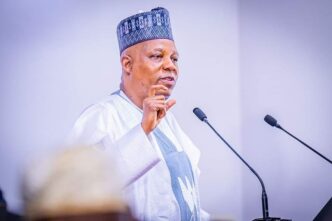The Nigerian Economic Summit Group (NESG) Chairman, Olaniyi Yusuf, highlighted seven critical priorities for the nation’s economic strategy while speaking at the 31st summit on Monday.
These priorities form the basis of the first strategic phase, dubbed “consolidation,” which is designed to stabilise the economy and ensure that policy changes move beyond mere statistics to become “real improvements in daily life” for citizens.
Following this foundational phase, the country will move into a second, more ambitious phase of “acceleration.” The initial priorities focus heavily on creating a more robust and attractive business environment.
Yusuf emphasised the need to drive industrialisation and enterprise growth by prioritising reliable power, efficient logistics, and pervasive digital connectivity.
This must be coupled with increased investment in energy, transport, logistics, and housing, as well as expanding broadband for education, healthcare, and commercial enterprises.
Furthermore, Nigeria must signal that it is open, predictable, and fair to investors to foster trust and long-term commitment.
To ensure macroeconomic stability, the chairman stressed the importance of strengthening revenue and monetary policy to sustain growth and tame inflation through output expansion, all while maintaining exchange rate credibility.
This growth must be inclusive, requiring the nation to advance inclusion so that benefits are felt in households through expanded safety nets, improved education, healthcare, food supply, and jobs.

He asserted that policies must be explicitly pro-youth, pro-women, and pro-poor, ensuring opportunity is widely shared.
The final two pillars address governance and safety.
Yusuf called on the government to strengthen institutions, ensuring that reforms are embedded in systems rather than depending on personalities.
He cautioned regulators to enable businesses, not stifle them, warning that a narrow focus on internally generated revenue (IGR) that neglects commercial growth will “kill the goose that lays the golden egg.”
Finally, the chairman designated security as an essential enabler of reform, noting that without peace, “reforms cannot take root,” farmers cannot plant, and investors cannot take risks.
Tackling insecurity in both rural and urban areas is therefore vital to unlocking productivity and restoring confidence.
Beyond the consolidation phase lies acceleration, which represents the second, more ambitious phase of the strategy. This involves a structural transformation that extends beyond simple diversification.
Nigeria must focus on building competitive, high-value-added industries, scaling up the export of services in sectors like ICT and the creative industries, and strengthening linkages between the extractive and manufacturing sectors.


 Trending
Trending 







